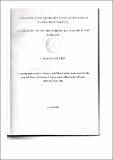An Investigation of Branding Strategies Used by Tea Packers in Kenya.A Case Study of the Registered Tea Packers in the Industry.

View/
Date
2008-06Author
Njue, Lee Kimathi
Type
ThesisLanguage
enMetadata
Show full item recordAbstract
There has been a global slump in prices of tea from 3.3 $ per kilo in the 1970's to the current average of 1.6$ per kilo. This represents a drop of 47% due to global over production, declining tea consumption and other tea substitutes. The question facing tea producers and marketers is whether their foray into branding of their products will assist in changing this in order to grow earnings. The objective of this study was to investigate and determine the extent to which branding strategies are pursued by the registered tea packers in Kenya and to identify the factors hindering the practice of product branding. The results of the study will benefit tea packers, academicians, consumers of tea products, and all stakeholders of the industry. This study used a descriptive research design. The Target population was the registered tea packers in Kenya. It was comprised of the brand managers of the registered tea packing companies. Since it was a census survey study no sampling was done. The data was analyzed by use of frequencies, mean scores and standard deviation to determine the levels of product branding. The data was analyzed using frequencies, percentages, mean scores and standard deviation while output of the data analysis was presented in tables. The study revealed that that the level of product brand development and management is still very low because it is practiced at a substantial level by only 14% of the packers who are the market leaders. The other 86% have not developed sufficient capacities to carry out significant brand development and management. The response rate was 60% of those targeted, this compromised the quantity and quality of data collected hence reduced research accuracy. The study recommends that tea packers in the industry should develop further and expand their capacities for brand development and management and in effect their brand marketing strategies. This should be with a view to developing long term internationally recognized brands that can possess global brand presence in terms of presence, value and equity. The study also recommends a study be done to determine the competitive advantages arising out of product branding to tea packers in both the local and international markets.
Publisher
KeMU
